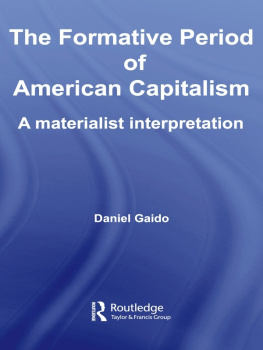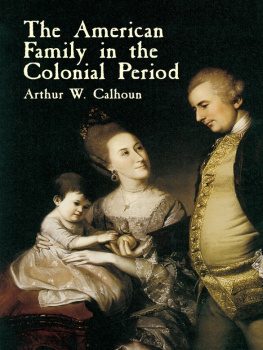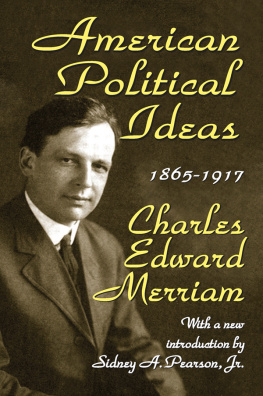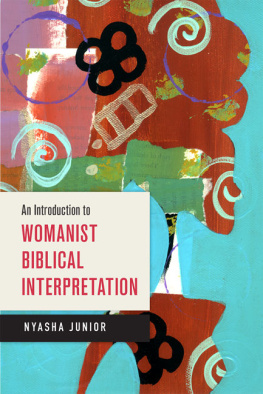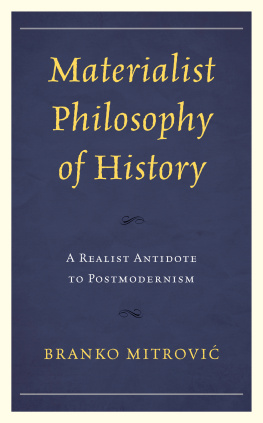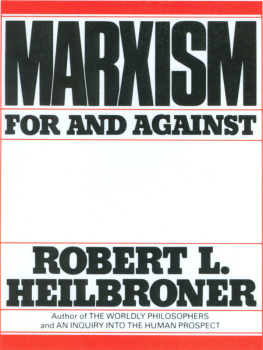The Formative Period of American Capitalism
Although the United States is the dominant force in contemporary world politics, critical overviews of American historical development are relatively rare due to the historic weakness of the American left. The Formative Period ofAmerican Capitalism offers a Marxist analysis of American history from its origins until the First World War.
The book analyzes topics including the following: the influence of the ethnic cleansing of the native Americans and the enslavement of the African population on the American bourgeois revolutions (the American Revolution and the Civil War); Lenins study of the American path of bourgeois development and the almost direct transition from a colonial to an imperialist economy toward the end of the nineteenth century; the influence of plantation slavery, sharecropping, and segregation on the development of the African-American community and on US politics at large; the origins of American imperialism from the 1898 Spanish-American War to the First World War; and the rise of the American socialist movement from the First International of Karl Marx to the creation of the Third International by Lenin and Trotsky.
The Formative Period of American Capitalism is addressed to both an academic audience of Americanists and the general reading public interested in US history. The book can be used as an introduction to American politics, and will also be of interest to the growing audience of political activists who want to know more about the historical origins of a country whose corporations and foreign policy have such a crucial impact on the lives (and deaths) of peoples all over the world.
Daniel Gaido is a Visiting Lecturer at the Hebrew University, Jerusalem.
Routledge International Studies in Business History
Series editors
Geoffrey Jones and Mary Rose
1 Management, Education and Competitiveness
Europe, Japan and the United States
Edited by Rolv Petter Amdam
2 The Development of Accounting in an International Context
A Festschrift in honour of R. H. Parker
T. E. Cooke and C. W. Nobes
3 The Dynamics of the Modern Brewing Industry
Edited by R.G. Wilson and T.R. Gourvish
4 Religion, Business and Wealth in Modern Britain
Edited by David Jeremy
5 The Multinational Traders
Geoffrey Jones
6 The Americanisation of European Business
Edited by Matthias Kipping and Ove Bjarnar
7 Region and Strategy
Business in Lancashire and Kansai 18901990
Douglas A. Farnie, David J. Jeremy, John F. Wilson,Nakaoka Tetsuro and Abe Takeshi
8 Foreign Multinationals in the United States
Management and performance
Edited by Geoffrey Jones and Lina Galvez-Munoz
9 Co-operative Structures in Global Business
A new approach to networks, technology transfer agreements, strategic alliances and agency relationships
Gordon H. Boyce
10 German and Japanese Business in the Boom Years
Transforming American management and technology models
Edited by Akira Kudo, Matthias Kipping and Harm G. Schrter
11 Dutch Enterprise in the 20th Century
Business strategies in small open country
Keetie E. Sluyterman
12 The Formative Period of American Capitalism
A materialist interpretation
Daniel Gaido
The Formative Period of American Capitalism
A materialist interpretation
Daniel Gaido
First published 2006
by Routledge
2 Park Square, Milton Park, Abingdon, Oxon OX14 4RN
Simultaneously published in the USA and Canada
by Routledge
270 Madison Ave, New York, NY 10016
Routledge is an imprint of the Taylor & Francis Group, an informa business
2006 Daniel Gaido
This edition published in the Taylor & Francis e-Library, 2006.
To purchase your own copy of this or any of Taylor & Francis or Routledges collection of thousands of eBooks please go to www.eBookstore.tandf.co.uk.
All rights reserved. No part of this book may be reprinted or reproduced or utilised in any form or by any electronic, mechanical, or other means, now known or hereafter invented, including photocopying and recording, or in any information storage or retrieval system, without permission in writing from the publishers.
British Library Cataloguing in Publication Data
A catalogue record for this book is available from the British Library
Library of Congress Cataloging in Publication Data
A catalog record for this book has been requested
ISBN10: 0-415-39173-3 (Print Edition)
ISBN13: 978-0-415-39173-3
A Mariel mi compaera
Introduction
On December 29, 1890 the Seventh Cavalry killed more than 300 Lakota (Great Sioux Nation) prisoners at Wounded Knee Creek, in the territory of Dakota. The Wounded Knee massacre was the final armed chapter in a three-centuries-long policy of genocide aimed at replacing the native population of the United States with European settlersthe last of the so-called Indian wars, which Native American scholars call by the more accurate name of Settlers wars. This policy reduced the native population of the United States from an estimated 10 million inhabitants in 1492 to the barely over 237,000 Native Americans reported by the 1900 censusthe same one that announced the closing of the frontier, that is the end of the settlement process.
Less than eight years later, on June 10, 1898, US troops landed at Guantnamo Bay, Cuba, in one of the first battles of the Spanish-American War. The immediate cause of the first American imperialist crusade was the depression which broke out in 1893the worst crisis of overproduction and overinvestment in the United States until the Great Depression of the 1930s. The crisis led to the rise of a modern labor movement and to the appearance of a farmers organization called the Peoples Party. Bourgeois alarm at the workers and farmers unrest joined to the existing fears that industry and capital had exceeded the capacity of the home market to push the United States into its first overseas military adventure, giving birth to an interventionist foreign policy that continues to this day. Thus, in the short space of a decade, the United States stood at the crossroad of the two main trends in its history: the end of settler-colonialism and the rise of imperialism.
In the aftermath of the Spanish-American War the United States annexed Hawaii and turned into formal or informal colonies the islands of Puerto Rico and Cuba in the Caribbean, as well as Wake Island, Guam, and the Philippines in the Pacific Ocean. The war also led to the seizure of Panama from Colombia in 1903 and to the construction of an inter-oceanic canal in order to unite the two halves of the new American empire. In the Philippines, US troops killed approximately a quarter of a million people during the repression of the independence war which began in 1899. This policy, and the subsequent military occupation of Haiti (191534) and the Dominican Republic (191624), was no impediment for the white supremacist American President Woodrow Wilson to declare, in his War Message of April 2, 1917, that the United States wanted to intervene in the First World War in order to make the world safe for democracy. American imperialism for the first time presented its aims as a democratic crusade against Prussian militarism, much as the subsequent war of intervention against the Bolshevik Revolution was presented as a defense of parliamentary (capitalist) democracy against socialist dictatorship.

